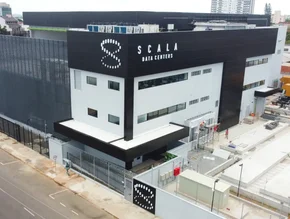How Meta Will Power Data Centres with its In-House AI Chips

Meta is planning to deploy a new version of a custom-made chip into its data centres that is designed to support the company’s artificial intelligence (AI) development.
First reported by Reuters, the parent company of Facebook is bidding to deploy its second-generation of chips to reduce the company’s reliance on NVIDIA chips. Given that NVIDIA AI chips currently dominate the market, Meta’s custom AI chips are designed to provide greater compute power and efficiency than other CPUs.
Already a leading chip provider for the data centre industry, these new in-house chips could work to control rising costs associated with running increased AI workloads.
A global desire for AI
Meta first revealed its plans to develop its own custom chips for running AI models in May 2023, in addition to new data centre architecture to support increased AI workloads.
The new Meta chip, referred to by Meta as ‘Artemis’, can perform a process known as inference - where models use algorithms to make ranking judgments and generate responses to user prompts. Artemis is part of Meta’s AI silicon project, with the company also reportedly working on a chip that is capable of both training and inference processes.
It is the company’s hope that a chip like Artemis could offer improved efficiencies. Currently, Meta is working hard to boost its generative AI (Gen AI) offerings and recently planned to purchase approximately 350,000 H100 CPUs from chipmaker NVIDIA by the end of 2024.
Moving forward, the company aims to better leverage the power of AI within the data centre, highlighting that this will be more cost-effective and provide greater flexibility for customers.
Improving data centre architecture to support AI workloads
The chips required to run AI applications have become more energy-draining and a huge cost for technology companies, as a result of a widespread global technology boom.
A Meta spokesperson confirmed to Reuters that the company hopes to put its updated chip into production in 2024, stating that it would work in tandem with the graphics processing units (GPUs) that the company is purchasing. These GPUs often have AI use cases.
Mark Zuckerberg outlined Meta’s AI strategy at the start of 2024, having announced that the company has already commenced training on its Llama 3 platform. He stated that this was as part of a move towards developing artificial general intelligence (AGI), whilst continuing to advocate for safe and transparent AI development and use cases.
In the wider global data centre landscape, it is important for industry leaders to accelerate their strategies to meet the rising enterprise demand for new technologies. This will only continue to be a priority, as a recent study suggested that AI could be on track to consume as much electricity as an entire country every year.
Meta’s data centre facilities are a large part of its global infrastructure that aims to bring technologies and services to life around the world. In line with its recent sustainability strategy, the company is aiming to become water positive across all of its operations by 2030.
******
Make sure you check out the latest edition of Data Centre Magazine and also sign up to our global conference series - Tech & AI LIVE 2024
******
Data Centre Magazine is a BizClik brand






